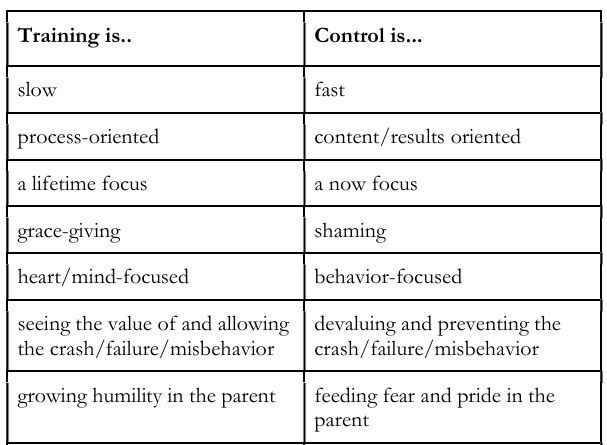If the walls of my office could talk, they would tell you that one of the most commonly discussed topics is how to effectively use consequences to positively impact kids. Finding consequences to address concerning behaviors seems to be an ongoing challenge for parents.
Here are some tips that are often helpful:
Consequences are meant to train. Without structure, a climbing plant will remain on the ground and struggle to develop into its full potential. With the structure and support of a trellis, the plant has the ability to know where to grow and where not to grow. It can climb and become stronger. I don’t think of consequences as punishments or incentives. They are the structure that supports our kids’ learning and growth
Consequences aren’t intended to control. Here is a chart that helps differentiate between training and control

Consequences are ineffective if they are wrapped up in parental reactivity. When a parent is dysregulated (allowing the emotion they feel to be the emotion they show in an unfiltered way) or reactive (angry and yelling, angry and silent/withdrawing, hurt and lecturing, hurt and sulking, etc) the consequence to the child becomes the parent's emotional reaction. This gets really complicated for a couple of reasons:
1- It’s difficult to help a child navigate through their emotions when a parent is caught up in her own dysregulated or reactive emotions.
2-If the consequence (example: pull weeds for 15 minutes) is also accompanied by parental reactivity (example: withdrawal and silence by a parent), there are actually two consequences going on at once. The actual consequence (the chore) and the emotional/relational consequence of the parent’s reactivity (withdrawal and silence). Limiting the number of variables while parenting is the gift we can give ourselves!!! So, let’s regulate, decrease reactivity. REGULATE BEFORE YOU COMMUNICATE! The best training occurs when we can stay CALMLY CONNECTED in the middle of addressing concerns. (Easier said than done but Choosing to Train can help you understand how).
Effective consequences are consistent. Consistency means the consequence occurs each time the behavior occurs no matter which parent is on the scene. This is not always possible when there is divorce or relational challenges between parents, but with an increase in consistency there will be an increase in effective training. Consistent consequences also help simplify the process of addressing the behavior by helping parents have a plan when the behavior occurs. Parents are less reactive in a situation when they have a plan they feel confident about. When parents feel unsure or unprepared they are more likely to be reactive. Have a consequence in mind and be ready to give it in a calmly connected way….every time…
Stay tuned for part II with more helpful considerations to effectively use consequences.


